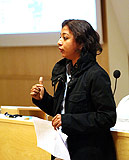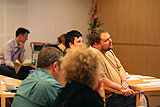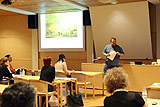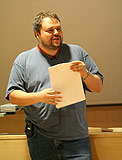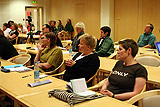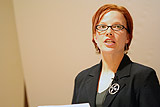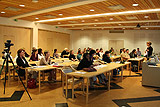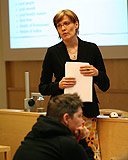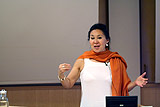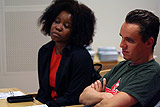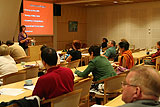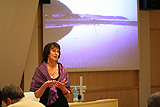
Beyond Subject and State?
Indigenous Interests in the Age of Globalization
The Arctic Centre, Rovaniemi
June 17 – 18, 2006
This two-day conference focused on challenges faced by Sámi, Inuit, and other indigenous peoples in the age of neo-liberal globalization. It asked how the transferal of power from the nation state to the global economy influences such deep-rooted concerns as cross-border politics, the right to land and natural resources, and self-organization. The discussion payed special attention to how class, race, gender, and sexuality influence social standing and therefore political interests. Simultaneous interpretation was available throughout the hearing.
Click here for audio slide shows of the conference presentations
Participants
Archana Hande (India)
Richard William Hill (Cree, Canada)
Rauna Kuokkanen (Sámi, Finland/Canada)
Kaisa Raito (Finland/Swedish Sápmi)
Henriette Rasmussen (Greenland)
Makere Stewart-Harawira (Waitaha, New Zealand/Canada)
Moderator
Scott Forrest (Canada/Finland)
Conference Program
Day 1: June 17
Introduction to the conference by Kuratorisk Aktion (Curators of Rethinking Nordic Colonialism) and Scott Forrest (Researcher, Communications, and Education Planner, The Arctic Centre, Rovaniemi). (24:35 min.)
“Representation and Problems for Indigenous North American Agency,” a presentation by Richard William Hill (Writer and Curator. Ph.D. Candidate at Middlesex University, London, United Kingdom). The presentation is followed by a Questions & Answers session. (61:48 min.)
“INUIT – A Struggle for Cultural Space,” a PowerPoint presentation by Henriette Rasmussen (Educator and Journalist. Former Minister of Culture, Education, Science and Ecclesiastical Affairs, Greenland Home Rule Government). The presentation is followed by a Questions & Answers session. (40:48 min.)
“Sámi Women, Autonomy, and Decolonization in the Age of Globalization,” a presentation by Rauna Kuokkanen (Postdoctoral Scholar, Institute on Globalization and the Human Condition, McMaster University, Hamilton, Ontario, Canada. Founding Chair of the Sámi Youth Organization in Finland, and former Vice- President of the Sámi Council). The presentation is followed by a Questions & Answers session. (39:04 min.)
General Discussion and Closing Remarks. (59:50 min.)
Day 2: June 18
Opening Remarks by Scott Forrest (Researcher, Communications, and Education Planner, The Arctic Centre, Rovaniemi). (27:20 min.)
“Environmental Politics in Sápmi: The Conflict Between Sámi Reindeer Herding and State Forestry in Anár/Inari, Finnish Sámpi,” a PowerPoint presentation by Kaisa Raitio (Activist and Ph.D. Candidate at Joensuu University, Finland). The presentation is followed by a Questions & Answers session. (49:50 min.)
“Home Grown,” a presentation by Archana Hande (Visual artist. BFA from Visva Bharati, Santiniketan and MFA from MS University of Baroda, India). The presentation is followed by a Questions & Answers session. (41:30 min.)
“Nation States and the Struggle for Empire: Indigenous Peoples in the Interregnum,” a presentation by Makere Stewart-Harawira (Assistant Professor in Indigenous Peoples Education, Department of Educational Policy Studies, University of Alberta, Canada. Interim Director of the International Research Institute in Indigenous Education, Health and Development). The presentation is followed by a Questions & Answers session. (44:04 min.)
Archana Hande is a visual artist, who holds a BFA in print making from Visva Bharati, Santiniketan (1986-91) and a MFA in print making from MS University of Baroda, India (1991-93). In 2000, she was awarded the Charles Wallace India Trust Arts Award, a residency in Glasgow School of Arts. Hande has had many solo shows, among others: Play House (Mumbai, 1998), The Veil-Shop (Bangalore, Mumbai, 1999), The Journal (Bangalore, 2003), and www dot arrange your own marriage dot com (Mumbai, 2005). She has participated in many national and international group shows, among others: Sites of Recurrence (Borås Konstmuseum, Sweden and Dakshinachitra, Madras), The Edge of Desire: Recent Art in India (Art Gallery of Western Australia, Perth; Asia Society and Museum, New York; Tamayo Museum, Mexico City; and Museum of Contemporary Art, Monterrey), Art Circus (Yokohama Triennial 2005, Japan), Icon of the Millennium (Mumbai), Are we like this only? (Delhi), and Gift for India (Delhi and Mumbai). From 2001-05, Hande was a member of Open Circle, an artists’ initiative based in Mumbai, during which time she organized and participated in many public space events, for instance Reclaim our Freedom Week (Mumbai) and India Sabka (Mumbai). In 2004, she participated as an artist and an organizer in the World Social Forum in Mumbai and curated the show A/P Artist Proof for Gallery Chemould in Mumbai. In 2005, Hande was the delegation leader for Seeds of Peace and in 2006, she worked as a stage and costume designer on the play “Orientation” for a London-based theater company. Hande has also written articles for a couple of Indian publications. Online art work: www.arrangeurownmarriage.com. [Archana Hande]
Archana Hande participated in Act 4’s conference with the paper “Home Grown,” which she summarizes as follows: “In contemporary India, ‘home grown’ means ‘indigenous,’ ‘native,’ ‘Aboriginal’… The term ‘tribal’ is also used, which connotes ‘blackness.’ All these terms designate something ‘original.’ My paper addressed the question of who the indigenous peoples and migrants of India are and what their rights are. Contemporary India continues to tackle these questions. The paper focused on the issue of displacement and rehabilitation of indigenous people and migrants from certain areas in India. This involved a discussion of existing culture, growth of a city, linguistic complications, and identity, which is closely linked to language, religion, caste, and land.” [Archana Hande] To download the paper, click ![]() here.
here.
Richard William Hill is an independent curator and writer of Cree heritage. As a curator at the Art Gallery of Ontario, Canada, he oversaw the museum’s first substantial effort to include North American Aboriginal art and ideas in permanent collection galleries. He also curated Kazuo Nakamura: A Human Measure at the Art Gallery of Ontario in 2004 and co-curated, with Jimmie Durham, The American West at Compton Verney, United Kingdom in 2005. He recently curated The World Upside Down for the Walter Philips Gallery at the Banff Centre, Canada, which opened in fall 2006. Hill’s essays on art have appeared in numerous books, exhibition catalogues, and magazines. He has a long association with the Canadian art magazine Fuse, where he was a member of the board and editorial committee and remains a contributing editor. Hill also teaches Aboriginal art history and contemporary art at York University, Toronto, and is a Ph.D. Candidate at Middlesex University, United Kingdom, where he is researching the problem of agency in the art of Jimmie Durham. [Richard William Hill]
Richard William Hill participated in Act 4’s conference with the paper “Representation and Problems for Indigenous North American Agency,” which he summarizes as follows: “Since the late 1970s, there has been a sustained critique of the representation of indigenous North Americans, both in academic and activist circles. Many of these critiques have taken the form of discourse analyses, which argue that these representations are largely fictions crafted to rationalize the injustices of colonization. These representations pose problems for indigenous agency both in the fact of their dominating discursive space about us and also through particular narratives and visualizations that specifically undermine the notion of indigenous agency. Two significant tropes that I explore are the conflation of the indigenous with the natural and the discourse of the vanishing Indian. I examine not only how these discourses have functioned against our agency in the mainstream, but also how they have, in some instances, been internalized in indigenous communities, particularly around certain forms of cultural nationalism. I also look at strategies that contemporary indigenous artists have used to defy expectations and enter into and become agents within contemporary discourse.” [Richard William Hill] To download the paper,
click ![]() here.
here.
Rauna Kuokkanen is currently a post-doctoral scholar at the Institute on Globalization and the Human Condition, McMaster University, Hamilton. She holds a MA in Sámi Language and Literature (University of Oulu, Finland) and Comparative Literature (University of British Columbia, Canada) and a Ph.D. in Education (University of British Columbia, Canada). Her dissertation was awarded a Recognition for Excellence by the American Educational Research Association (Postsecondary Education) Dissertation Award Committee in 2004. She is the editor of Juoga mii geasuha (2001), an anthology on Sámi literature and author of The Responsibility of the Academy and the Gift of Indigenous Epistemes (forthcoming). Dr. Kuokkanen has published articles on indigenous research paradigms and critical theory, indigenous literature, the gift paradigm, and globalization and indigenous women. She also regularly contributes to Sámi and Finnish newspapers. She was the founding Chair of the Sámi Youth Organization in Finland, established in 1991, and has served as the Vice-President of the Sámi Council. Currently, she is a member of the Board of Directors of Terralingua, International Organization for Protection of Biocultural Diversity, and a member of the Call of the Earth Circle, Indigenous Peoples’ Initiative on Intellectual Property Policy. [Rauna Kuokkanen]
Dr. Rauna Kuokkanen participated in Act 4’s conference with the paper “Sámi Women, Autonomy, and Decolonization in the Age of Globalization,” which she summarizes as follows: “The notion of strong Sámi women prevails in contemporary Sámi society. The Sámi women also have a long history of activism in promoting the rights of the Sámi to self-determination and their land. My paper examines the myths, realities, and challenges of Sámi women in the contexts of the Sámi movement for self-determination and continued colonial relations. It also considers the significance of indigenous and postcolonial feminist analysis to the transformation and decolonization of contemporary Sámi society.” [Rauna Kuokkanen] To download the paper, click ![]() here.
here.
Kaisa Raitio is a postgraduate student at the University of Joensuu, Finland. She is finalizing her Ph.D. on environmental policy, with the working title Environmental Conflict Management in State Forest Use in Finland. She is particularly interested in the justifications given to the choices made in the state-run processes in which different, and often conflicting, needs related to state forests are reconciled, and in the underlying factors for those justifications, such as existing institutional arrangement and framing of the disputes. One of her case studies is the conflict between reindeer herding and forestry in Anár/Inari, Finnish Sápmi. Kaisa Raitio was also one of the social scientist participating in RENMAN, an international EU-funded research project on reindeer-human interrelations, coordinated by the University of Lapland in 2001-03 (www.ulapland.fi/home/renman). Raitio’s interest in environmental conflicts derives from her background as an activist in the Finnish forest conservation movement during the mid-1990s. [Kaisa Raitio]
Kaisa Raitio participated in Act 4’s conference with the PowerPoint presentation “Environmental Politics in Sápmi: The Conflict Between Sámi Reindeer Herding and State Forestry in Anár/Inari, Finnish Sámpi,” which she summarizes as follows: “Disputes and conflicts have become a regular part of policy processes related to the environment. The ability to take into account different interests in the decision making process in a way that respects the pluralistic values present in today’s society has become one of the most challenging tasks in environmental policy making. In Sápmi, arguments related to ethnicity, colonialism, supra-local decision-making, and issues of land ownership add to the challenge of resolving disputes over the use and protection of the natural environment. The paper analyses environmental policy in Sápmi through one case study, the conflict between reindeer herding (practiced predominantly but not exclusively by Sámis) and state forestry. The justifications provided by the state authorities for their actions and decisions are analyzed. Special attention is given to the role of the institutional arrangements regarding state forests as well as the way the dispute is being framed by the state authorities on the one hand and by the reindeer herders on the other. The case study shows that despite the official commitment to multiple use of forests and the need to safeguard reindeer pastures in state forests, the staff responsible for implementing these goals in the Finnish Forest and Park Service (Metsähallitus) and in the Ministry for Agriculture and Forestry continue to perceive the issue from a predominantly timber production oriented perspective. The missing or unclear legal framework for state forestry and public participation undermine the credibility of the efforts to resolve the conflict. It can be concluded that in addition to accurate frames, successful conflict management also depends on a credible institutional framework that would (re-)establish the needed trust in the dispute resolution process.” [Kaisa Raitio] To download the paper, click ![]() here
here
Henriette Rasmussen is born and raised in Greenland. She is an educator and a journalist. She has had a long political carrier as member of the Municipal Council in the capital of Nuuk and as member of the Home Rule Parliament, last serving as Minister of Culture, Education, Science and Ecclesiastical Affairs until November 2005. Rasmussen is committed to the rights of women and the rights of indigenous peoples internationally. From 1996-2000, she served as Chief Technical Advisor for the International Labour Office in Geneva, Switzerland. She has also been a manager of the Greenland Publishing House, publishing Greenlandic literature. She is an Earth Charter Commissioner (www.earthcharter.org) and has been active in the Inuit NGO environment and the Inuit Circumpolar Conference for many years. In addition, Rasmussen was instrumental in the creation of the Permanent Forum for Indigenous Issues in the United Nations, New York, USA. [Henriette Rasmussen]
Henriette Rasmussen participated in Act 4’s conference with the PowerPoint presentation “INUIT – A Struggle for Cultural Space,” which she summarizes as follows: “My presentation addresses Greenlandic experiences in maintaining cultural heritage or the failure in doing so. What succeeded and what didn’t? It reflects on the postcolonial period, the cultural policies of home rule Greenland, and new demands caused by the direct impacts of human induced climate changes. The Inuit people of Greenland, who traditionally are hunter-gatherers, are facing serious threats to their traditional life style. This is partly due to their own choices of development, but also the demands of globalization have put them in a big dilemma. With home rule, Greenland has the most far-reaching autonomy compared to any other indigenous people. The country has managed to build up a modern society, with the world’s most modern fishing fleet for shrimp and one of the world’s most expensive infrastructures. However, the bilingual education system and big money invested into that has only slowly given competence education for the native Greenlanders. The environmental degradation and pollution of the environment caused by the industries in Europe, North America, and recently also South East Asia also constitutes a big threat to the very health of the peoples in the Arctic. It is a big concern of the peoples in Greenland and we have to pay careful attention, even to what we eat. Not only the environment and the animals, but also the peoples of the Arctic, are jeopardized by the pollution coming from these industrial areas. We have been successful in working for our human rights, but with these new environmental threats, Inuit must ask the governments in the industrial areas to develop their economies using appropriate technologies, which limit significantly the emission of greenhouse gases causing the degradation of an otherwise clean environment.” [Henriette Rasmussen] To download the paper, click ![]() here.
here.
Makere Stewart-Harawira is currently an Assistant Professor in Indigenous Peoples Education in the Department of Educational Policy Studies at the University of Alberta, Edmonton, and the Interim Director of the International Research Institute in Indigenous Education, Health and Development. Dr. Stewart-Harawira is known internationally as a public speaker on issues involving globalization and indigenous peoples and for her recently published The New Imperial Order: Indigenous Responses to Globalization, which has received international acclaim. Dr. Stewart-Harawira has been actively involved in issues to do with globalization, Maori education, and indigenous peoples for over a decade. She received her doctorate and her Masters degrees from the University of Auckland, New Zealand, and has been the recipient of a number of prestigious prizes and awards. Dr. Stewart-Harawira has an extensive background in teaching and research in Maori education. In Aotearoa/New Zealand, prior to her move to Canada two years ago, she taught at Te Whare Wananga o Awanuiarangi, a Maori tribal university, and at the University of Auckland. Dr. Stewart-Harawira is of Waitaha (Maori) and Scots ancestry, is a mother of six, and a grandmother of five. She has been an international spokesperson for Waitaha since 1995 and is a member of the Council of Grandmothers for Waitaha. [Makere Stewart-Harawira]
Makere Stewart-Harawira participated in Act 4’s conference with the paper “Nation States and the Struggle for Empire: Indigenous Peoples in the Interregnum,” which she summarizes as follows: “The shaping of the global order has historically been a contested project and never more so than in the present. In the contemporary globalized moment, three thematics predominate in the literature. One is the debate around the diminishing power of the nation state. This is increasingly located alongside debates concerning the nature of 21st century imperialism. The burning question here is no longer whether empire, but whose. The second thematic is neo-colonialism in the context of globalization. The third is that of postcoloniality with an emphasis on alterity and difference. Indigenous peoples have become increasingly important actors in the global arena. Disparate and unique in our cultural, ideological, and historical differences and in our experiences of colonialism past and present, indigenous peoples face a shared and profoundly critical challenge. In this transformational moment of disintegration and reintegration, what is the nature of response?” [Makere Stewart-Harawira] To download the paper, click ![]() here.
here.
